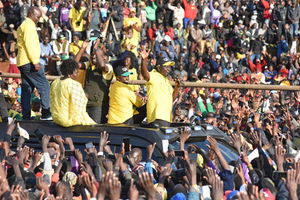
If the Judiciary was corrupt yesterday, it’s still corrupt today.
People in the public eye, especially state officials and the opposition, should say what they mean and mean what they say.
This is critical for public morality, the rule of law, and the integrity of public discourse. An official shouldn’t say one thing today and another tomorrow, particularly without a change of circumstances. A color cannot be blue today and red tomorrow unless you paint over it.
Today, I want to focus on the double-speak of those in high stations in our society. We need to fact-check our leaders because they are very economical with the truth.
Or lie without batting an eyelid. This has become a Kenyan disease. We are forging a nation of conmen and liars – fibbers.
I raise the issue of dissembling and fibbing by our leaders because of the ongoing debate about corruption in the Judiciary. I am tired of folks creating their own “facts” to fit a cooked “truth.” The truth doesn’t change.
A fact can’t be true today and then untrue tomorrow simply because your own personal circumstance in life has changed. Nor is there anything like an “alternative fact.” That is what we call in common language a lie.
The danger of cooking facts to suit oneself is that the truth becomes elusive. As a result, society can never agree on what ails it, and how it should be fixed. We must agree on basic facts as a country or we are sunk.
Question – is the Judiciary corrupt or not? On the matter of corruption, the Judiciary itself has spoken with authority and without equivocation. Several damning reports, especially the one by Justice Kwach, speak volumes.
We remember the infamous “judicial surgery” under the Kibaki NARC administration. In that sordid affair, the process was irredeemably compromised to collapse the attempt to jettison corrupt judges.
We can’t forget Justice Aaron Ringera’s checkered attempts to try and “slay” the “dragon of corruption” within and without the Judiciary. Former CJ Willy Mutunga himself in 2015 decried embedded corruption in the Judiciary.
Fact – corruption in the Judiciary isn’t debatable. It’s as deep as the deepest Indian Ocean. Every Kenyan knows that this basic fact is indisputable.
In my view, there are usually three fundamental threats to the rule of law and the independence of the Judiciary. The first is state capture and emasculation by the political branches, especially the Executive. The second is the cancer of corrupt cartels by business interests in cahoots with judges and the private bar.
The last is the devil within – poor, corrupt, and unethical judicial leadership by the chief justice and the Judicial Service Commission, corrupt and unethical judges and judicial staff, and lack of standards and infrastructure to combat corruption within. Judges don’t do corruption alone. It’s a web and ecosystem of corrupt networks bringing together judges, political and business interests, and senior actors in the legislature and the executive.
Judicial corruption is therefore systemic. Those who point an accusing finger at judges should beware that the other four fingers are pointing back at them. But one must start somewhere because corruption networks are so powerful and entrenched they have defeated every attempt to corral them.
That’s why in 2016 when I ran for Chief Justice I proposed a transparent and public forensic financial and assets audit of all judges, magistrates, and all prospective aspirants for those positions. I will bet every dollar I have that as high as 90 percent all judicial officers will flunk such an audit. Our Judiciary is infested with unconscionable thieves. They are protected by godfathers in the political branches and the business world.
Let me address political corruption and hypocrisy.
In 2022, as the electioneering period reached a crescendo, the matter of judicial independence took center stage. Then Vice President William Ruto took on his boss Jubilee leader Uhuru Kenyatta over his refusal to appoint six high court judges to the appellate bench. Mr Kenyatta held that some, though not all, weren’t kosher. Mr Ruto bludgeoned him for what he called an attack on the Judiciary. That punch landed squarely like a bull’s eye and negatively ricocheted on Azimio.
Fast forward. Now President Ruto has launched a scathing assault on the same Judiciary calling it genetically corrupt. He’s even vowed to defy judicial edicts that seek to cripple his agenda. That’s not the way.
Fact is Azimio lambasted the corrupt Judiciary in the aftermath of the election petition which it lost. Azimio called for the dismantling of the Supreme Court. Azimio was right then. But today Azimio is defending the “corrupt” Judiciary from President Ruto. That’s not the way.
If the Judiciary was corrupt yesterday, it’s still corrupt today. Both Azimio and Kenya Kwanza have the wrong approach. You can’t support the Judiciary and overlook its corruption when it favors you but defend it and turn a blind eye to its corruption when your opponent attacks it. All must come together to clean up judicial rot.
- Makau Mutua is SUNY Distinguished Professor and Margaret W. Wong Professor at Buffalo Law School, The State University of New York. @makaumutua.







